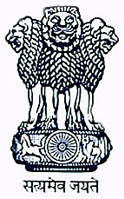On October 2, an exhibition dedicated to the 150th anniversary of Mahatma Gandhi and telling about his friendship with the Russian writer Leo Tolstoy was opened at the State Duma of the Russian Federation.
Mr. D.B. Venkatesh Varma, Ambassador of the Republic of India to the Russian Federation, Mr. Sergey Neverov, Deputy Chairman of the State Duma, Head of the “United Russia” faction, Mr. Vladimir Zhirinovsky, Head of LDPR (Liberal Democratic Party of Russia) faction, Mr. Nikolay Kolomeytsev, First Deputy Head of СPRF (Communist Party of the Russian Federation), Mr. Dmitry Novikov, Deputy Chairman of the Central Committee of CPRF faction, Ms. Irina Belikh, Member of the United Russia faction, Mr. Mikhail Shvydkoy, Special Representative of the President of the Russian Federation for International Cultural cooperation, and Mr. Nikolay Rizhak, Deputy Head of the “Spravedlivaya Rossiya” faction, took part in the opening ceremony.
Mr. D.B. Venkatesh Varma, Ambassador of the Republic of India to the Russian Federation, noted that Leo Tolstoy had a huge impact on Mahatma Gandhi. “This great friendship has influenced the course of events not only in India, but throughout the world. It has become a symbol of friendship between the great peoples of India and Russia,” said Ambassador. He also mentioned that in early September, President Vladimir Putin handed over to Prime Minister Narendra Modi a postage stamp dedicated to 150th anniversary of Mahatma Gandhi.
Mr. Neverov stated that this exhibition is devoted to friendship and communication between the two greatest thinkers - Leo Tolstoy and Mahatma Gandhi, whose influence on the development of modern humanism can hardly be overestimated. According to Mr. Neverov, today India is one of the key partners of the Russian Federation. “Our relations are strategic in nature, developing on the basis of respect, equality and mutual benefit. Of course, cooperation in the fields of economics, politics, security is of great importance for our countries, but socio-cultural ties are no less important, and perhaps even more important. The friendship of Tolstoy and Gandhi is one of the most striking examples of this,” said the State Duma Deputy Chairman. He also expressed gratitude to the State Duma’s Committee on International Affairs and the Embassy of India for the exhibition.
Mr. Neverov also recalled that the two thinkers had a great influence on each other in terms of the idea of non-violent resistance in the name of the good of the nation. “Representatives of all political parties are here today. This is important, because the works of Gandhi and Tolstoy were aimed at the fact that it is nonviolent changes that can take place in society,” said the Deputy Chairman. Mr. Vladimir Zhirinovsky urged to disseminate the ideas of Mahatma Gandhi as much as possible not only to coincide with his anniversary, but also to conduct “Lessons of the World” in schools, in order to tell the younger generation about the need to reject any evil.
Mr. Nikolai Kolomeytsev noted that it was Mahatma Gandhi who was able to "achieve independence without firing” in India. Ms. Irina Belykh mentioned that the exhibition is an important event for two nations. “There are two generations between Tolstoy and Gandhi,” she said. “But, despite this, the ideas that the great Russian writer was preaching were picked up at the other end of the world by a young man.”
Mr. Mikhail Shvydkoy stated that the successful cooperation between India and Russia “is based on a kind of spiritual attraction of the two peoples, on some kind of spiritual attention to what is happening in the life of the two countries”.
“Today we live in a quite pragmatic world. People say that the world is ruled by interests, that material well-being prevails over the understanding of values. But for some reason, when we think about life, we return to these two sages,” said Shvydkoy. - They seem idealists today, their words about “non-resistance to evil by violence” seem like an incredible romantic utopia, but this utopia attracts humanity every second, even those people who live in a world of pragmatism, interests, and material values, that will never replace what the two great man wrote about to each other."
Mr. Nikolay Ryzhak emphasized that “sacrifice, non-resistance to evil by violence, the desire for dialogue, respect for human dignity and justice were the basis of the worldview and teachings of Mahatma Gandhi”. He called for these beliefs to be made “the basic rule of behavior for all our politicians - supporters of peace on earth.”












